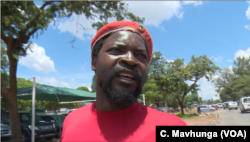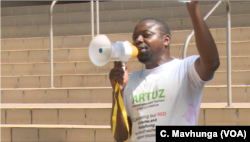A group of teachers finished a 300-kilometer protest march Thursday to push President Emmerson Mnangagwa’s government to pay them in U.S. dollars and improve their working conditions. But, the government refused to meet with them when they arrived in Harare.
Members of Amalgamated Rural Teachers’ Union of Zimbabwe sang “No to bond notes salaries” as they arrived in Harare Thursday.
That marked the end of their two-week-long march from Mutare to Harare, where they wanted to petition the government to pay them in U.S. dollars.
“We should be paid in U.S. dollars, because we last negotiate with the government in U.S. dollars, now they are saying the U.S. dollars is 1-to-1 with bond note, when the reality is not the same when you want to buy. The bond note is not equivalent to the U.S. dollar,” said Robson Chere, the secretary-general of the Amalgamated Rural Teachers Union of Zimbabwe.
The teachers say the bond notes are losing value and are worth about one-fourth of a U.S. dollar. Zimbabwe started printing the currency two years ago to ease cash shortages.
This month, Zimbabwe’s doctors were the first to demand salaries in U.S. dollars, and they are still on strike.
Health minister Obadiah Moyo said the government can’t meet these demands.
“We don’t want to lie to each other or waste each other’s time,” he said. “We all know that there is no foreign currency to even buy the medicines, which they use in hospitals, let alone foreign currency to be paid to individuals.”
The teachers’ “salary caravan” was blocked by arrests until Zimbabwe Lawyers for Human Rights intervened for the release of the teachers who had been detained during the protest.
“It was a journey which we faced some challenges along the way: victimization, some of our colleagues injured, developed blisters,” union chief Chere said. “Also we were arrested several times along the way as well. They were frustrating us because they did not want us to reach Harare send a message to the government.”
After being denied a meeting with Zimbabwe’s finance minister, Mthuli Ncube, teachers’ union official Obert Masaraure said the protest will continue.
“We will permanently reside here, schools are not going to be opening, all the teachers are gong to be residing here,” he said. “We are confident that when schools open, more teachers are going to be residing here until the grievance of salaries is addressed. We are determined to be here for as long as it takes.”
Wednesday, the government said Vice President Constantino Chiwenga would soon meet the striking doctors.
President Mnangagwa plans to meet Friday with another group of teachers that did not take part in the salary caravan.
The marching teachers say they don’t need a meeting because the president already knows their problems and demands.







